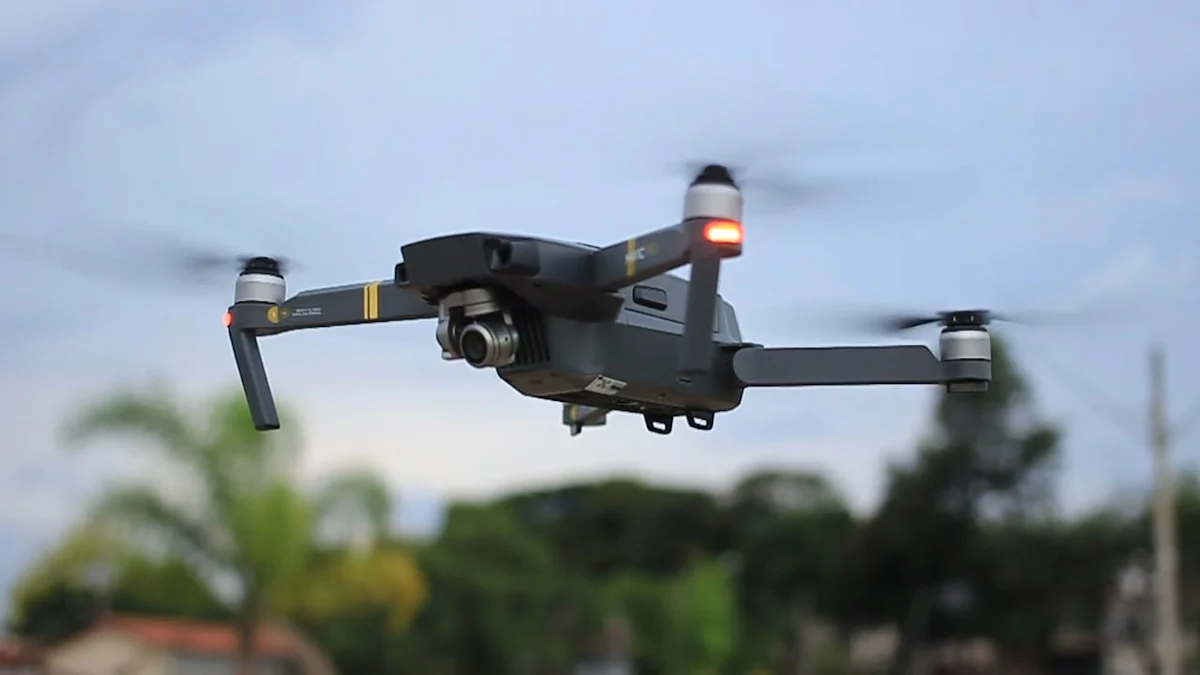Maximizing Drone Surveillance with iSun Analog FPV Thermal Camera

Exploring the Basics of Drone Surveillance
Drones have revolutionized the field of surveillance, offering unique capabilities and advantages in various applications. Let's delve into the role of drones in modern surveillance and understand the significance of thermal imaging in this context.
The Role of Drones in Modern Surveillance
From Military to Civilian Use
Drones were initially developed for military purposes, where they played a crucial role in reconnaissance and intelligence gathering. However, with advancements in technology and accessibility, drones have transitioned into civilian and commercial domains. Today, they are employed for diverse tasks such as aerial photography, agriculture monitoring, infrastructure inspection, and search and rescue operations.
The Evolution of Drone Technology
The evolution of drone technology has been remarkable, leading to enhanced capabilities and functionalities. Modern drones are equipped with advanced sensors, high-resolution cameras, GPS navigation systems, and real-time data transmission features. These technological advancements have significantly expanded the scope of drone applications, including surveillance and monitoring.
Understanding Thermal Imaging
How Thermal Cameras Work
Thermal imaging cameras operate based on the detection of heat signatures emitted by objects or individuals. Unlike traditional cameras that rely on visible light, thermal cameras capture infrared radiation emitted by objects due to their temperature. This enables them to create detailed heat maps that can reveal hidden elements or individuals within a given environment.
Benefits of Thermal Imaging in Surveillance
The integration of thermal imaging technology enhances surveillance capabilities by providing visibility in low-light conditions or environments with limited visibility. Drones equipped with thermal image cameras can detect heat signatures from a distance, making them invaluable for search and rescue missions, wildlife monitoring, security operations, and environmental surveys.
Enhancing Surveillance with the iSun Analog FPV Thermal Camera
In the realm of drone surveillance, the iSun analog FPV thermal camera stands out as a game-changing tool, offering advanced capabilities to elevate monitoring and reconnaissance missions.
Key Features of the iSun Analog FPV Thermal Camera
Thermal Imaging Capabilities
The iSun analog FPV thermal camera is equipped with state-of-the-art thermal imaging technology that enables it to detect and capture heat signatures with exceptional precision. This feature allows for unparalleled visibility in various scenarios, including low-light conditions and environments where traditional cameras may fall short. The ability to discern heat disparities provides a distinct advantage in identifying objects or individuals that may be obscured from view.
FPV Functionality for Real-Time Feedback
One of the standout features of the iSun analog FPV thermal camera is its First Person View (FPV) functionality, which facilitates real-time transmission of thermal images to the operator. This real-time feedback empowers operators to make swift and informed decisions during surveillance operations. The immediate access to thermal data enhances situational awareness and enables proactive responses to unfolding events, making it an invaluable asset in critical situations.
Integrating the iSun Camera with Your Drone
Compatibility and Setup
Integrating the iSun analog FPV thermal camera with your drone is a seamless process designed for user convenience. The camera's lightweight and compact design ensure compatibility with a wide range of drone models, allowing for versatile deployment across different platforms. Additionally, its user-friendly setup minimizes complexities, enabling swift integration without compromising operational efficiency.
Optimizing Camera Settings for Surveillance
To maximize the surveillance potential of your drone equipped with the iSun analog FPV thermal camera, it's essential to optimize the camera settings based on specific mission requirements. Fine-tuning parameters such as image resolution, temperature sensitivity, and color palettes can significantly enhance the effectiveness of thermal imaging during surveillance operations. By customizing these settings according to environmental conditions and operational objectives, operators can extract optimal performance from this cutting-edge technology.
Utilizing this innovative combination of aerial drones and advanced thermal imaging capabilities opens up new frontiers in surveillance and monitoring applications.
Real-World Applications of FPV Thermal Cameras in Drones
The integration of iSun analog FPV thermal cameras with drones has unlocked a myriad of real-world applications, expanding the scope of surveillance and monitoring capabilities across diverse domains.
Search and Rescue Operations
Locating Individuals in Distress
In search and rescue missions, the utilization of FPV thermal cameras in drones plays a pivotal role in locating individuals who may be stranded or injured in remote or inaccessible areas. The thermal imaging technology enables responders to detect heat signatures emitted by individuals, even in challenging terrains or dense foliage where visibility is limited. This capability significantly enhances the efficiency and effectiveness of search operations, increasing the chances of timely intervention and successful outcomes.
Nighttime and Low Visibility Conditions
During nighttime operations or in environments with low visibility, traditional visual surveillance methods may prove inadequate. However, drones equipped with iSun analog FPV thermal cameras excel in these conditions, as they can detect heat differentials and generate thermal images that reveal objects and individuals regardless of ambient lighting. This capability extends the operational window for search and rescue efforts, ensuring continuous monitoring and detection capabilities even under challenging environmental circumstances.
Wildlife Monitoring and Environmental Surveys
Tracking Animal Movements
Wildlife monitoring benefits extensively from the deployment of FPV thermal cameras on drones, enabling researchers to track animal movements with precision. The thermal imaging technology facilitates the identification and observation of wildlife species based on their heat signatures, offering insights into their behavior patterns, migration routes, and habitat preferences. This non-intrusive approach to wildlife monitoring minimizes disturbances while providing valuable data for conservation efforts and ecological research.
Assessing Environmental Conditions
In environmental surveys and ecological studies, iSun analog FPV thermal cameras contribute to assessing environmental conditions with unparalleled accuracy. By capturing thermal images of landscapes, water bodies, and vegetation, these cameras provide valuable data on temperature differentials, ecosystem dynamics, and potential environmental anomalies. This information aids researchers in evaluating ecological health, identifying biodiversity hotspots, and detecting changes in natural habitats that may require conservation interventions.
The seamless integration of iSun analog FPV thermal cameras with drones has ushered in a new era of surveillance applications across various sectors.
Tips for Maximizing Your Drone's Surveillance Capabilities
As you venture into the realm of drone surveillance, it's essential to consider key factors that can optimize the effectiveness and efficiency of your aerial monitoring operations. From selecting the right drone to implementing best practices for surveillance, here are valuable tips to enhance your drone's surveillance capabilities.
Selecting the Right Drone for Surveillance
Considerations for Range and Battery Life
When choosing a drone for surveillance purposes, prioritizing extended range and prolonged battery life is paramount. Opt for drones equipped with long-range transmission capabilities, allowing them to cover expansive areas without compromising signal strength. Additionally, enhanced battery life ensures extended flight durations, enabling sustained surveillance missions without frequent interruptions for recharging or battery replacements.
Evaluating Camera Compatibility
The compatibility of the drone with advanced surveillance cameras is a crucial aspect to assess. Look for drones that support high-resolution imaging systems and offer stable mounting options for specialized cameras such as thermal imaging devices. Seamless integration with cutting-edge camera technologies enhances the surveillance potential of drones, enabling them to capture detailed imagery essential for monitoring and reconnaissance tasks.
Best Practices for Drone Surveillance
Planning Your Surveillance Missions
Effective planning is fundamental to successful drone surveillance missions. Before deployment, meticulously outline mission objectives, designated flight paths, and areas of interest for comprehensive coverage. Consider environmental factors such as weather conditions and terrain characteristics when strategizing mission plans. Thorough planning ensures systematic data collection and optimized utilization of surveillance resources.
Navigating Legal and Ethical Considerations
Adhering to legal regulations and ethical guidelines is imperative in drone surveillance operations. Familiarize yourself with local aviation laws governing drone usage, including airspace restrictions and privacy regulations. Prioritize ethical considerations related to data collection and privacy protection, ensuring that surveillance activities uphold ethical standards and respect individuals' rights to privacy.
By adhering to these tips, you can elevate the effectiveness of your drone's surveillance capabilities while maintaining compliance with legal and ethical standards.
Utilizing this innovative combination of aerial drones equipped with advanced thermal imaging capabilities opens up new frontiers in surveillance applications across various sectors.
Wrapping Up
The Future of Drone Surveillance
Technological Advancements on the Horizon
The future of drone surveillance is poised for remarkable advancements, driven by ongoing innovations in aerial technologies and imaging systems. Anticipated developments include the integration of artificial intelligence (AI) algorithms to enhance data analysis and pattern recognition capabilities. This will enable drones to autonomously process and interpret surveillance data, leading to more efficient identification of relevant targets and anomalies. Furthermore, advancements in miniaturization and energy efficiency are expected to result in lighter yet more powerful drones, extending their operational range and endurance for prolonged surveillance missions.
Expanding Applications and Opportunities
As drone technology continues to evolve, the applications of aerial surveillance are set to expand across diverse sectors. Beyond traditional domains such as security, emergency response, and environmental monitoring, drones equipped with advanced thermal imaging capabilities are projected to play a pivotal role in infrastructure inspection, precision agriculture, and disaster management. The versatility of drones combined with thermal imaging opens up new opportunities for enhancing operational efficiency, safety protocols, and resource allocation in various industries. With expanding applications comes the potential for novel collaborations and interdisciplinary approaches that harness the full potential of drone-based surveillance solutions.
Final Thoughts on Using the iSun Analog FPV Thermal Camera
Enhancing Security and Operational Efficiency
The utilization of the iSun analog FPV thermal camera represents a significant leap forward in bolstering security measures and operational efficiency across diverse sectors. By integrating this cutting-edge technology with drones, organizations can elevate their surveillance capabilities to unprecedented levels. The ability to capture thermal images from an aerial perspective empowers operators with enhanced situational awareness, enabling proactive responses to potential threats or emergencies. Moreover, the real-time feedback provided by the FPV functionality ensures swift decision-making during critical operations, contributing to heightened security protocols and streamlined workflows.
Personal Reflections and Recommendations
In conclusion, my experience with the iSun analog FPV thermal camera has underscored its transformative impact on aerial surveillance endeavors. Its seamless integration with drones offers a comprehensive vantage point for monitoring activities while leveraging advanced thermal imaging functionalities. I highly recommend exploring the potential of this technology across various applications such as search and rescue missions, wildlife monitoring, infrastructure inspections, and environmental surveys. Embracing this innovative solution not only enhances operational efficacy but also fosters a proactive approach towards addressing evolving security challenges.
In summary, the future holds immense promise for drone-based surveillance initiatives fueled by technological advancements and expanded opportunities across diverse sectors.
See Also
Optimizing Drone Efficiency with iSun Analog FPV Thermal Camera
Enhancing Drone Monitoring with Analog FPV Thermal Cameras
Maximizing Drone Monitoring with FPV Thermal Camera Tech
Enhancing Drone Potential: Leveraging Analog FPV Thermal Cameras for Monitoring and Recon
Optimizing Drone Potential: Utilizing Analog FPV Thermal Cameras
Contact Us: Ms. Coco Huang
E-mail: sales@iasun.cn
WhatsApp/Wechat: +86 13510421923

